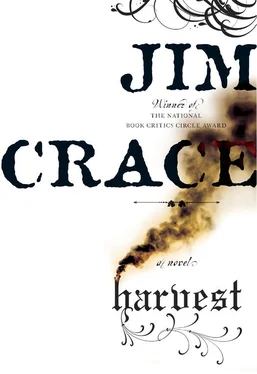But it has not been so. Somehow the village was already burdened by misfortune before its future rode in on a horse, before the Dream of Golden Hoofs came near. There were the fires. There were the doves. There were those raised, unfriendly bows. There was the woman and her disquieting face, breaking short the dance. There was the body at the pillory, or that much of the body left behind by pigs. It feels as if some impish force has come out of the forest in the past few days to see what pleasure it can take in causing turmoil in a tranquil place. And now, the worst — if it is right to count the death of a horse as worse than the death of a man — his Willowjack is dead. That is heartbreaking. She was Mistress Kent’s own horse. And it is frightening too, because whoever killed the mare was stabbing Master Kent as well. Of course, he cannot talk to me or open up his heart just yet. We are surrounded by the cousin’s men. And Master Jordan himself is never out of hearing. My master only offers me a shrug, a pulse of hands and chin and mouth but sadly eloquent. It says, These are the blackest days for us, old friend. I raise my eyebrows in reply. Indeed, we’ve never known a more alarming day.
We have gone beyond the hearing of the threshing barn. The flailing and winnowing continue steadily behind. Only Mr. Quill, the steward Baynham and the groom are unaccounted for, though I imagine the first two are working as an awkward pair on manuscripts and charts. I hope to be at Mr. Quill’s side this afternoon preparing paints and parchments as originally intended, but for the moment I am regarded as “cousin Charles’s fellow” and required to lead our party to the family homes, the heart of everything, identify the absent occupants by name and then stand by with Master Kent while Lucy Kent’s cousin-by-blood and his sidemen step indoors to pull away the coverings, lift the matting and the reeds, upturn all the storage chests, and shift the barrels and the benches in search of bloody rags. It’s rare for me to peer into so many private rooms, to glimpse how cramped some places are, how full the beds, how modest their possessions, how buckled is the furniture. I am surprised by neatness and by dirt, by evidence of last night’s food and evidence of none. It’s certain that you cannot tell from how a person works or how a person strolls behind her hens what kind of life they live in secrecy.
I am embarrassed when we reach the Carrs’ dwelling. John and I do not put up our feet at each other’s hearths. We are good friends but meet and talk only in the open air. We sit outside and understand that neighbors should not pry. Neighbors should be deaf and blind. “Take care,” I ask the men as they go in. But they are too impatient and detached to take much care. I sense my request has only made them more suspicious of the Carrs. I have to step away. I cannot bear to listen to the evident disruption. John will never understand why I did not go in to try to stop the breakages.
It is embarrassing as well to wait outside the widow’s house and hear the thudding of the overturning bed, still warm, as I suppose, from me and her. Still rocking, possibly. But thus far there has not been any sign of butchery, not even in Abel Saxton’s cottage. The only blood they find is on a kerchief in my place. I have to match my hand to it and have the master vouch for me, report my “courage” in the burning stable block. I evidently saved the best part of his hay. Only then can Master Jordan be persuaded I am not a suspect.
So we reach the last of the village’s twenty or so inhabited dwellings and we are allowed to rest while the sidemen go to check the sties and byres, the whitehouse and latrines, the brewing shed, the outbuildings and any nooks and crannies where a bloody shirt might readily be hid. It is Master Jordan himself who walks up the tangled path toward the tenement where Cecily was raised. And it is Master Jordan himself who almost at once reemerges into the light with a cry of satisfaction and holding a heavy, bloodstained wrap of cloth. At first the master and I think it is too dark to be the woman’s velvet shawl. But all too soon the truth is unignorable. First, the sunshine catches on its silver threads, and then the shawl is opened up and the color is confirmed, the rich and heavy Turkish mauve. Shake it one more time, I want to call out to the man, and see who topples out into that thistle bed.
Actually I hold my tongue, and so does Master Kent, even when his cousin throws the shawl across a fence and invites us to identify its owner.
“Give me her name,” the cousin says, addressing me, the villager, but one he seems to trust, though possibly only because I’m not as stolid or corn-haired as the rest.
“I truly do not have a name for her,” I say, and indeed it’s not entirely a lie. I can put a face to her. I can describe her roughly sheared scalp which must by now be softening and blackening with hair. I’d not mistake her dark and shiny belladonna eyes for any other woman’s in the village. But other than the byname Mistress Beldam conferred on her by Master Kent, she has no title of identity. “I’ve never seen one of my neighbors wearing that. By all my heart,” I say.
I leave it to my master to recognize the garment and the culprit, and do his heavy duty. He will have judged by now that the woman who spat at Willowjack also slaughtered her. She crept into the barn, where so recently she brought the dancing to an end, searched the tool chest for a spike and somehow lifted up that heavy churchyard stone to bring it down with spiteful and indignant force. From any other man but Master Kent I would expect a response of matching spite and indignation. He loved his Willowjack. But he does not even seem surprised to link the woman and the horse. He does not think her actions justified. Why visit anger on a horse? But clearly she was righteous in a way. Her kin — and still we do not know what kin he was, her father probably — was taken to the pillory on Master Kent’s command and was abandoned there to be consumed by pigs. What man with any heart could say the woman had no grounds? And so I am not surprised when Master Kent does not identify the owner of the shawl for cousin Edmund Jordan. He is prepared to blame himself for Willowjack. But neither does he hide behind a tricky truth, as I have done. Instead he says, “That shawl was my wife’s, your cousin Lucy Kent’s.” There’s not a cottager round here who’d have the means to gain a shawl like that, nor the opportunity. That much is clearly true.
Master Jordan nods. “Then who … then who lives in that derelict? It seems to me that someone’s sleeping there.”
“A vagrant, possibly. Some passing midnight pillager.” The master shakes his head, biding time by making show of his bewilderment. The tale that he eventually suggests is this: someone has come through overnight, a ruffian. He’s crept into the manor house and, finding it too occupied by lightly sleeping men, has taken leave with only Lucy’s velvet shawl as his bounty.
“It was hanging at the back of her old loom until last evening,” he explains. “Our mothy visitor means to sell it when he reaches any town, most probably — or he only meant to sleep in it, up there in that old tenement. But first he took the opportunity to steal the finest mount for his future travels.” Master Jordan is nodding yet again. “He will have chosen Willowjack, of course, rather than one of your serviceable horses, cousin Edmund,” Master Kent continues, warming to his narrative. “But Willowjack is loyal and skittish. I think we can presume the fellow took a kick from her. Or else she nipped him hard. A vulgar, violent person would have sought revenge for that.”
Master Jordan has pursed his lips. He is considering. It is not that he is such a stony-hearted moralist that he is looking forward to the gibbeting of a local man. But it will serve his purposes if through the death of this old mare he is able without cost to make his sudden mark on this inheritance. There’s nothing like a show of heavy justice — and a swinging corpse — to persuade a populace not used to formal discipline that their compliance in all matters — including those regarding wool and fences — is beyond debate. He’s made his threats and promises. He has already disturbed and violated everybody’s home. He will lose face and thereby some control if what Master Kent describes is true. The miscreant was not a local man; the miscreant has come and gone, it seems.
Читать дальше












